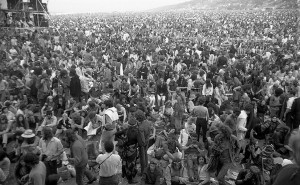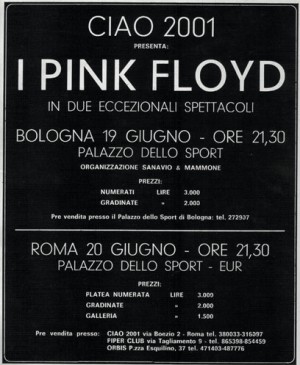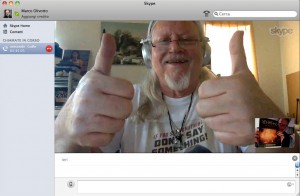Armando Gallo – The Interview | 2 | Genesis
[Pt. 1 is here.]
I suppose your contact with Tony Stratton-Smith led you to Genesis.
My contact with Tony was a good thing. I didn’t go on being a journalist: I was a big rock fan, but the following year “BIG” magazine kind of folded, because the same publisher started “Man” and “Playman”, and they went, bang! through the roof. So they stopped publishing “BIG”. “BIG” had absorbed “Ciao amici” and became “Ciao Big” and after some chaos it re-emerged as “Ciao 2001”.
In 1970 I wrote a truthful article about the disgusting aftermath of the festival at the Isle of Wight. Bob Dylan got paid $600.000, a huge sum then, and the festival wasn’t very well organized: there were good moments, but it was really a fucked-up place, with so much trash… it wasn’t the way to treat pop music, I felt. My article didn’t get published, but Saverio Rotondi, who was the accountant of the publisher, took over the magazine as editor in chief, and he called me up saying:
“I am the new publisher of Ciao 2001 and people aren’t using you at all well in this magazine. I like what you write from London, so could you assume me to write two articles a week? I give you card-blanche to write about the new scene: I don’t want to hear anymore about The Beatles, I don’t want to hear about The Rolling Stones: I want you to write about everything that is happening in London right now, the new bands. And – can you also write a column of news every week?”
I mean, this was the call that probably I’d been waiting since I’d written the Rita Pavone article. I didn’t meet Rotondi, we just spoke on the phone. That came from the unpublished article about the Isle of Wight: he read it and thought, “this guy has the pulse of what’s going on in London”. Maybe. This was in September 1970.
I was smacked in the middle of an incredible English musical renaissance that sprouted from the void left by the split of The Beatles. All these new bands started playing and suddenly they were everywhere. They didn’t have strong management yet; there was a lot of passion… Pink Floyd had a booking agent called Steve ‘O Rourke who later became their manager. I know this because I used to book bands from him for the Titan Club in Rome in 1967 and 1968… I booked The Gun, Brian Auger, White Rabbit for Massimo Bernardi of the Titan Club and helped him to get also Jimi Hendrix and I got a gig for Pink Floyd for the Regent Street Polytechnic for £200, in late 68. Dave Gilmour had replaced Syd Barrett and they needed to play live, practice. And they were so grateful that I’d managed to get £200 for them, and in 1971 when they came to Italy I went with them and I was asked to introduce them on stage in Brescia and Rome.
Anyway, within three months after Rotondi’s phone call I stopped working for Chamberlain Parking Systems and I became a full time professional journalist and photographer, because at that point I could take my pictures, and I was asked to take pictures and write the story. That became the famous “Fototesto di Armando Gallo”, and “Recentissime da Londra”.
In 1971 I tried to move back to Italy thinking I could find a good position in RAI or in some record company with all the experience that I had picked up, but it proved impossible because I was ahead of everybody at that point. I had changed, but Italy hadn’t. And it’s still the same today (laughs) Italy as a whole country has remained behind the world’s technological development. But in 1971 I stayed in Italy the whole summer, and worked from Ciao 2001’s office, in Rome and got to know better Saverio Rotondi… and went back to England with a better wage. So my real career started there, in a way. I also got to know all the Italian record companies and collaborated with them from London: many bands that would come to tour in Italy had a booking that I helped to provided for them, so in exchange they would pay for my trip, I would come to Italy and write the classic article ‘on tour with…’
When Genesis’ records were released in Italy their inner sleve would contain your translations of the lyrics, and that’s how I got to know you. That was the first time I read your name. The question is: back in 1978, when I was thirteen-years-old, I bought “Selling England By The Pound”: did you realize, at the time, how important it was to us on this side? Let me tell you… if I ever learned English, it was your fault in the end!
I’ll tell you, I learned English by reading and wanting to translate The Beatles’ songs. Once I translated The Beatles’ songs I could start reading some English, and I started reading rock magazines like Record Mirror. That was the first magazine I read, and in fact the first article I did in English was about The Rokes, for Record Mirror, in 1967.
So, in the summer of 1971 I came to Italy and started interviewing Italian bands like Le Orme, Rovescio Della Medaglia, I Pooh… Talking to them I realized that people were very hungry to know the meanings of the English songs, so when I went back to London, Saverio Rotondi added for me a column called “Sotto le note” [“Under the notes”]: people could write to me and ask for the translation of certain songs. So at that point Genesis were releasing “Foxtrot”, and I did “Supper’s Ready” for “Sotto le note”. Peter Hammill split Van Der Graaf Generator, who were # 1 in Italy… So the first solo album that he recorded after that was “Chameleon In The Shadow Of Night” and that was probably the first album I translated… The Italian release had the Italian translation. Peter Hammill was such an amazing poet and I thought – what the hell? When you publish a book by a foreign poet in Italy, we have the translation, so why not doing the same for album’s lyrics. What about Bob Dylan, people at CBS! I complained. … So I translated “Chameleon In The Shadow Of Night” and that came out with an Italian translation. At that point Genesis were recording “Selling England By The Pound”, and I did it that too. And the year after Genesis’ manager Tony Smith told me: “Armando, we’re coming out with an album, it’s a double album, there’s a complicated story, this and that, would you mind… I could get you together with Peter.”
Peter Gabriel was living in Bath at the time and he had written the whole story and the lyrics. Beautiful Jill, his wife just had a baby so I spent a weekend at their cottage. Do you remember the three pictures of me and Peter on my website? They were taken on that weekend in September 1974 when Peter tried to go through “The Lamb Lies Down On Broadway” with me. A big story, it was a lot of work.
So I translated the stuff literally, and whenever there was an asterisk Peter would tell me what it meant. But even when he told me, I couldn’t understand it! (Laughs)
You’re not the only one saying this thing about how you learned English, though. A few years ago I was at the Sanremo festival, sometime in the 90s, and I was with a bunch of suits, business people from Mondadori Publishing… and this guy came over… “Yes, yes, it’s him!” He shouted towards another table. He was the manager of Radio Popolare in Milan and asked: “Are you Armando Gallo?” He reached over the table and said: “You changed my life, man, I learned English because of your ‘Selling England By The Pound’ translation.”
I had a problem with the title of “I Know What I Like (In Your Wardrobe)”. People said – ‘wardrobe’ is not ‘armadio’; it’s what you wear! I said no, because I had read C. S. Lewis who had written “The Narnia Chronicles”, and in the first story they go through the ‘wardrobe’ and they find an incredible world… it was that! The wonderful world of Genesis.
You were mentioning a few Italian bands like Le Orme, and you were involved with PFM too, at some point. How did they compare to the English scene at the time?
PFM were great musicians and I think they could compare very well to the English and American musicians… they could stand very well the comparison and in fact I did the PR for PFM in London in 1974. They were voted best newcomer in New Musical Express, behind Golden Earring and Queen. I was their publicist and would send news to the music magazines about them every week. So they took me on tour with them in America in November 1974, to do the same thing on tour and wrote about it every week in “Ciao 2001”. Before MTV the promotion was done with live concerts and interviews on the radio and in the press. I went on tour with them in November and December and fell in love with America and California especially. Genesis were doing “The Lamb Lies Down On Broadway” in January, so I went to Charisma, their record label, and said: “If you fly me to California, I’ll shoot the concerts for Ciao 2001 and then I’ll give you all the pictures.” So they paid for the trip, they paid for the hotels… I was on tour with Genesis in San Francisco, Los Angeles and San Diego, and I kept maybe 50-60 slides and gave them the rest, and they lost them all! There was a black hole at Charisma. They lost everything! Anyway I moved to California in April 1975.
The week when I left to move to California, April 1975, Genesis were given the gold record for “Selling England By The Pound” at the Savoy Hotel.
Oh, there’s a picture of yours of that…
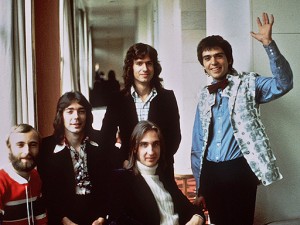
Genesis at The Savoy Hotel in London in 1975. © 1975 Armando Gallo.
Exactly. On that day Phil Collins took me aside and told me: “I’ve heard you’re moving to California and I want to let you know something, because I don’t want you to know from other people when it happens… I’m leaving the band, because I’m forming my own – but don’t tell anybody.” “Oh, my God, really?” So I moved to California, and in August someone told me: “Hey… did you hear? Peter Gabriel left Genesis.” “Ah, no, Peter Gabriel didn’t leave Genesis, Phil Collins did!” “No, Peter!” “Nooo…” So it was a double surprise for me. They kept very very quiet about Peter leaving the band. At that time probably Phil thought – Peter was leaving the band, the band would disband then, so he was jumping off the sinking ship and he was forming Brand X.
Anyway, the feeling from the outside was that you were very close to Peter Gabriel when he left. One of the things that I remember you for, although there was a gap between the two, is that you released two landmark books: one on Genesis, one on Peter Gabriel. “I Know What I Like” was, at least in Italy, probably the very first photographic book on a rock band which was well-done and well thought-out. Will you tell me one out of a million stories from that era, and how you related to them at that point? Either Genesis or Peter Gabriel, I mean.
At the beginning of 1976 I was living in California. I didn’t want to go back to Europe, at least for a year or two: I wanted to absorb California. I’d been in California for a year and Peter came over. He came to see me, we had dinner and then I said: “Let’s go out to Sunset Boulevard, let’s take some pictures at nighttime”. He was leaving the following morning. So, as I was taking some pictures I asked him: “What are you going to do, now, Peter? Are you going to record an album?” over dinner, as a laugh, he had told me that he had been “making babies and growing cabbages”. I told him: “Come on, you have to record an album…” And he said: “I don’t know, because we went to New York, we came here, we were hoping to get a publishing deal and an advance, so I could finance my first album, get the musicians I want because I want to use American musicians…”
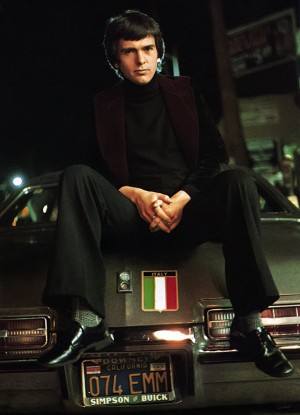
Peter Gabriel on Sunset Boulevard, circa 1976. © 1976 Armando Gallo.
Steve Hackett came out with “Voyage Of The Acolyte”, a surprise hit, and Genesis had just released “A Trick Of The Tail”, which went… BOOM! So the publishers at some point went: “Oh… we thought that Peter Gabriel was the driving force behind Genesis, but what did he do with Genesis? Is he really a good writer? Or is he going to give us a lot of problems?” As I was taking those pictures, the ones you’ve worked on, with Peter sitting on my Buick Centurion, exactly in that moment, there was a light coming from a lamp post behind his head and I thought: “I have to write a book, here…” I’d never written a book, but I thought I should write a book about what really happened in Genesis. I had to tell the story. And when I took that picture, to me it was the cover of the book. It was Peter Gabriel‘s angels, you know… because I wanted… as the bishop of all the underdogs… I spent my life like that! I really realized I needed to help to tell the real story and say who Peter actually was and what he did for Genesis. And probably he couldn’t do anymore with Genesis because the others wouldn’t allow him to do it, because he did everything on “The Lamb Lies Down On Broadway”. So he also left because after imposing his will in “The Lamb Lies Down On Broadway” the others would have told him “Now sit back, and let us do the next album”. In that moment I thought I’d write the book, and I thought I would do it for Italy. I never had in mind to do a book in English, as I never studied the language. At that time I had a column in Ciao 2001, called “California Voice”, with my address. So I had lots of mails, and most of them went: “Why did Peter leave Genesis? What’s going to happen? Genesis won’t exist anymore…” So I thought I’d write a book to answer all these questions.
And then Genesis came to play in Los Angeles, and it was so incredibly good that I thought: “Man, I’ll betray Peter if I write how good this Genesis is.” You know… So I went to Tony Smith and said: “I really loved the show, but I don’t know how to write it. Can you fly me to Fort Worth?” They were playing Fort Worth, in Texas. “I’ll give you the pictures if you pay for the flight!” Oh, that’s my story (laughs): “Pay for the flight – I’ll give you the pictures”. So I went to Fort Worth… and I wrote the story for “Ciao 2001”, and I fell in love again with Genesis, and then when the end of the year came it was time for me to go back to Europe after nearly two years in California. I wanted to experience the culture shock, you know… which was wonderful feeling. I wrote to the band that I was willing to write a book about them, could we meet? So we met. I have written about it in the introduction of the “Evolution…” book.
We met just two or three days before Christmas, had lunch with Mike Rutherford and Tony Banks. They had just released “Wind And Wuthering” and were starting a six-month tour from January 1st with 3 concerts at the famed Rainbow in London. I loved “Wind And Wuthering”… it was so beautiful and so romantic. It was just… great. So I asked them if I could sit down with them and interview them, and maybe go on tour with them and interview them after the concerts, you know, when no-one can sleep and the adrenaline from the concert still pumps. So at lunch Mike said: “Well, it’s going to be a lot of work, Armando…” “Yes, I know.” And Tony was more direct: “How do you want to start?” he asked. “Let’s start from you.” And I made the first interview with him, that afternoon, at his house in Twickenham, which turned out to be three hours long! And I round them up, and went on tour in England and picked up some interesting interviews and I knew that I had a great story to tell.
So… around February, Peter Thompson, the press agent of Genesis, got a phone call from an English publisher called Sidgwick & Jackson, who said: “We would be very much interested in publishing a book on Genesis”. Thompson reply was: “Oh, there’s already someone writing it and his name is Armando Gallo!” So with the first transcripts of the interviews I went to see Sidgwick & Jackson and met with Stephen DuSotoy. He thought I had written the book because the manuscript was this big! I had the transcripts in the briefcase with me. So he offered me a contract, a proposition which was truly ridiculous: 2,5%… “And what about the pictures?!” “OK, 4%…” but I didn’t sign anything. The band came to America in the Spring. I went to see them, but I was a bit disillusioned with book publishing.
In June Tony Smith called me up and said: “We are recording a live album in Paris, you should come; it would be good for your book and you could take pictures for the album cover.” I went over, I went with him to Sidgwick & Jackson to do a real deal… and Tony acted like my manager, got me a better deal, and we left for Paris.
Just before leaving Los Angeles I had seen the screening of this brand new movie called “Star Wars”. Right? Oh, hell! So when I saw them in Paris, at the end of “Afterglow”, when the two rows of 747 landing lights come down… to me it was a spaceship coming down! To me it was The Force! When I shot the photo from Steve Hackett side of the stage, I knew that I just shot the album cover. I ran backstage after the concert… I went off (opens his arms): “May The Force be with you!” Everybody thought I was crazy! (Laughs)
I said the phrase to everybody, but nobody knew what I was talking about. Peter Gabriel, of all people, asked me: “The Force? Is that… hum… the name of a new band?”
So I spent June on tour with Genesis. No one knew about “Star Wars” in Europe! Here’s why that picture, the cover of “Seconds Out” is so important to me, and when I finally showed the photos to the band in July, during a break from the mixing at Trident Studios when the photo came up they picked it up right away. I had the front cover, back cover and a dozen photos for the inside, chosen by the band. And I went back to the States to write the book and finish it. I had to deliver the final manuscript to Sidgwick & Jackson by the end of September…
In those days I discovered I couldn’t have kids. In a way I was kind of relieved, because being a father… it had taken me three or four years to work myself up to the idea and responsibilities of having a baby with Barbara, whom I’d been married to for 5 years. So it came to me that the deadline for the book was nine months since the day when I went to lunch with Tony and Mike and we had said, “Where shall we start?” The book was conceived then, and delivered nine months later, and I realized that maybe, in this lifetime, I should have different kinds of babies, you know? So the book was definitely my first baby.
And to go back to your question, when the book was published, in the summer 1978, it came out with… a picture of two feet on the cover! Not my photo! And the printing was so bad… I felt liked they screwed my baby up, you know? So I decided to do it myself, in America, because the deal was only for England and the Commonwealth countries. Nobody could fuck up my baby in America and the rest of the world!
So the following Summer I went to England. Phil had left the band, again, (smile) in January 1979 and moved with the family to Vancouver. In August after going on tour with Brand X he went back to England, and he was going to get back together with Genesis… He did “Intruder” with Peter Gabriel, who asked him to play the drums without cymbals and in that process he adopted a new drum sound that was the foundation of his solo productions later on… He helped Peter on the recordings of his third solo album and played with Peter at the Reading festival singing “The Lamb Lies Down On Broadway”, the song, together… and by the end of September the band had got together to write a new album which was going to be “Duke”.
Now… I went back to America and re-designed the book the way it was supposed to be, putting the pictures all together with the text, printed it well, using good paper… the color pictures had to be on glossy paper, so that they would pop out, and I did also a hardback, and a limited edition in leather. And that’s the book you saw in Italy…
I think… it’s here… I have it!
Yes! That’s the book that came out as DIY Books Europe, which I gave to my brother Claudio to distribute in Italy and in France, and which became the embryo of Fratelli Gallo Editori. That book was the first of its kind because I thought that Sidgwick & Jackson messed it up. That book, like any good biographical book, is directed to the hard core fans of the band or the artist in question, and I always thought: if someone is so big on a band and he is offered the opportunity to buy a biographical book he should be able to hold in his hands the best book ever, right? Not just a silly paperback…
[You may proceed to pt. 3 here.]
Tags: Armando, Collins, Gabriel, Gallo, Genesis
Trackback from your site.

